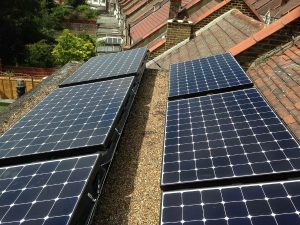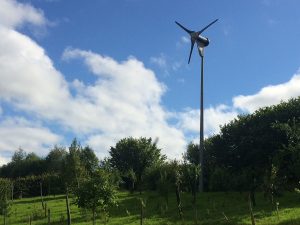This is the second part of an interview with Jon Halle of Sharenergy, about the prospects for keeping energy production local and mutualised. We talk about community energy, Energy Local and the Big Solar Co-op.[Part one and Part 3]
It’s the first day of Community Energy Fortnight today (when we spoke – June 14). How is community energy doing?
It remains very popular. It’s become more difficult though. 5 or 6 years ago, I’d go to see people in a town and we’d look at the maps and come up with 3 or 4 sites, of which we’d select 1 or 2 and do them. But with no subsidy, and other issues, that’s become impossible in many cases. The worst hit is wind, because there’s effectively a planning ban on onshore wind turbines in England. Only 5 big turbines have got planning permission over the last 5 years.
Is that opposition coming from the public?
It’s a ministerial statement of June 2015, based I think on a sense that a lot of Conservative supporters in rural areas really hated turbines.
Don’t the majority still like them though?
They do. The argument from the rural people is that most people who like them live in towns, so they don’t have to see them. But getting planning permission for a wind turbine was never simple. You had to show that you wouldn’t impact in terms of bats or wildlife, aviation, microwave links, noise, shadow flicker, heritage, landscape value. It was never simple, but now it’s become impossible in England. That’s restricting people, because there are plenty of communities where people do want to build turbines. Even in Wales and Scotland, where they can get planning permission, without a subsidy it’s hard to make wind add up, unless they’re multi-million pound projects that are beyond community groups.
I wanted to talk about Energy Local. The problem used to be that community energy groups can’t deliver energy directly to their local members, because they’d have to get a hugely expensive energy provider licence. So the group have to sell their energy to the National Grid cheaply (c. 5p per unit) and buy it back expensively (over 15p per unit). I understand that there’s a group called Energy Local that have a way for community energy members to get their energy from their local scheme. Is that right?
Energy Local have a model where customers can buy energy from a local, community-owned generator. The nub of the problem is that we’re not allowed to use the Grid to move our energy to people’s homes unless we’re a fully-licenced supplier, which is very expensive. It stops us having these end-to-end local co-ops that you find in places like Belgium, where community schemes have wind, hydro, solar and tens of thousands of local consumers on their books.
Why can they do it in other countries, but we can’t do it here?
They have different regulations around their grid. But Energy Local have set up some interesting pilots. In Bethesda in North Wales, locals can buy electricity from community hydro for about 9p per unit, rather than 17p per unit from the Grid. So it’s an amazing saving for the locals.
How do they get around the licensing problem?
They’re effectively working within a set of exemptions that allows them to do it. They’re pilot programmes though, that aren’t necessarily going to last forever in those locations, and aren’t necessarily transferable to other locations. So it’s a huge thing they’re doing, to test possibilities – but it’s not yet ready for prime time. There are reasons that it might be hard to do. Leaving Energy Local aside for a moment, there’s a generic view among a lot of people that the big energy companies are screwing us and we need to get rid of them completely, and generate our own cheaper, greener electricity. I was in that camp for a long time. My understanding of the energy industry has grown (through osmosis) since I’ve been doing this job, and I’ve come to realise that it doesn’t really work that way. The cheapest tariff you can get at home is about 14p per unit. The wholesale price is around 5p on average. That sounds like a rip-off. But there are levies to keep the network going, and some to pay for subsidy schemes – for example to provide insulation for people in fuel poverty. Now you want those things to continue, obviously. Those together might add up to 5p. So they’re charging 14p, but it’s not a huge profit margin. A lot of local energy schemes (esp. municipal) have gone bust spectacularly – so it’s not easy to do.
I’ve got a friend who’s an Energy Local convenor in Devon, so I’ll try to interview him about his experiences.
Energy Local are long-standing and strong. They also try to manage demand. If you think about when you use energy, you can reduce peak demand and help get more renewables in the system. But I think we’re at a moment right now, when we’re not going to move rapidly to local energy supply in the UK, so although it’s part of the mix, it’s maybe not the most important route to decarbonisation.
I know a few years ago, the government shifted support from community energy to ‘local energy’ – where local people don’t actually own the infrastructure. It tends to be owned by municipalities or corporates. Is that still the case?
The government’s real focus is on big energy, and largely on fossil fuels. That’s whose lobbyists their listening to, and where the tax breaks are going. Plus offshore wind – which is being prioritised to any wind onshore. And that can’t be local, because people don’t live offshore.
There are local authority energy schemes as well, aren’t there? I think Bristol and Nottingham have them.
They’ve both gone bust, as has Our Power in Scotland. The problem seems to be that running a small energy supply company is hard. It’s customer-service heavy, so you have to be good at that. But also you have to be good at buying energy. Understanding the energy market is difficult. It’s bonkers. To give you an idea – right now, wholesale energy prices are high – 7pish. That’s to do with the fact that it hasn’t been a windy year, so we haven’t had that. Lockdown has reduced demand, and there have been geopolitical problems around gas. Current spot prices for energy are affecting energy futures – ie the price we can charge for electricity in a year’s time. So to make sure you always have enough energy at the right price for your customers, you have to be very knowledgeable. I think a lot of those new providers couldn’t find the people who really understood it. I think Mary Gillie who started Energy Local is one of those people.
We’re interested in decentralised production and mutual ownership in all sectors, not just energy. Community energy schemes fulfil both of those criteria. The Big Solar Co-op is national rather than local, but it’s mutually-owned.
That’s the important thing for me. If you imagine that you’re an activist in Tewkesbury, and solar panels are put on roofs locally, by a national co-op, but people in Tewkesbury can buy shares in that co-op. So structurally, it’s pretty similar to them buying shares in a local Tewkesbury solar co-op, but if something goes wrong with the sites in Tewkesbury, you’re still part of an co-op owning arrays all over the country.
I interviewed Shaun Fensom, who runs a group that would like to re-cooperativise the Co-op Bank. That was a big national co-op, as was Co-op Energy, and neither of them are co-ops any more.
Part of Co-op Energy is owned by Mid-Counties Co-op, even though they’re delivering services through Octopus Energy. So a small part of it is still mutually owned.
The Co-op Bank is owned by a hedge fund now. So what’s to stop the Big Solar Co-op being bought out by E-on at some point?
It’s in the rules. This is why it’s taken so long to set up legally – to make sure that can’t happen. It’s been successful with other energy co-ops in the UK – I think only one has demutualised, out of hundreds.
So is there an asset lock in Big Solar Co-op’s founding documents? I know that the building societies that are still left had asset locks in their founding documents, and the ones that didn’t were sold and demutualised.
Community energy schemes are generally set up as Community Benefit Societies or Co-operative Societies. Societies can either have a legal / statutory asset lock, or an effective asset lock in their rules, through a common-ownership clause. They’re really hard for people to take over and take the good stuff out of. They’re dependable, so people can put their effort in and their money in, knowing that it’s not going to end up making somebody rich.
Highlights
- There’s effectively a planning ban on onshore wind turbines in England. Only 5 big turbines have got planning permission over the last 5 years.
- Energy Local have set up some interesting pilots. In Bethesda in North Wales, locals can buy electricity from community hydro for about 9p per unit, rather than 17p per unit from the Grid. So it’s an amazing saving for the locals.
- The Big Solar Co-op is pretty similar to them buying shares in a local Tewkesbury solar co-op, but if something goes wrong with the sites in Tewkesbury, you’re still part of an co-op owning arrays all over the country.













2 Comments
An article on Asset locks or other forms of “prevention of demutualization” would be amazing. The Building societies (briefly) covers it. There must be more methods though. Even co-ops and small traders want/are forced to get bigger.
Definitely on the list of things to discuss. Don’t see the need for small/sole traders / co-ops to always get bigger though.